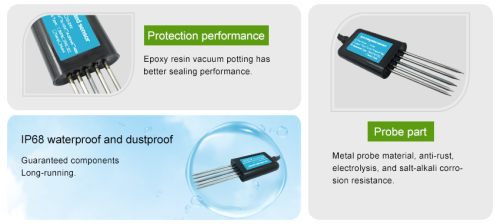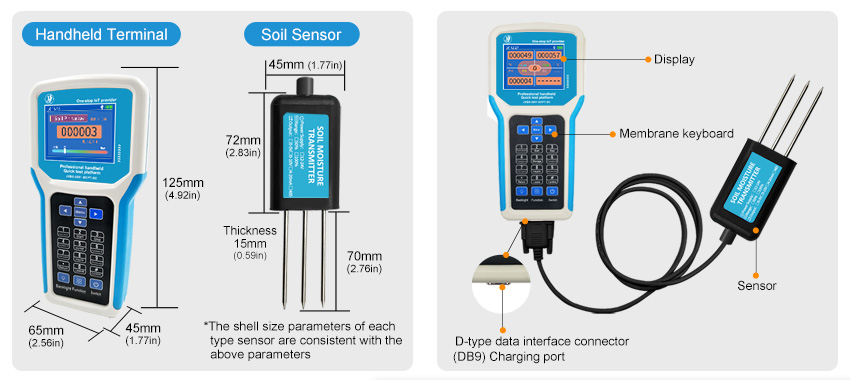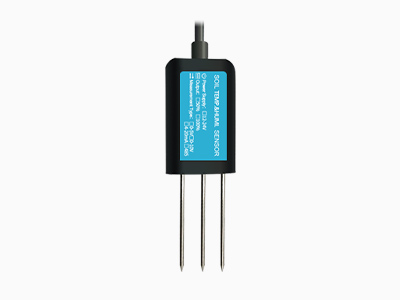Soil moisture probe have become an indispensable tool for measuring soil moisture content, providing valuable data for precision agriculture, environmental monitoring and research. However, choosing the right soil moisture probe is a complex task as it involves various factors such as soil type, crop requirements, accuracy, data management. In this comprehensive guide, we will explore the key considerations for choosing the best soil moisture probe for specific agricultural and environmental applications.
Choosing the best soil moisture probe considerations
Choosing the best soil moisture probe depends on several factors, such as the type of soil, the crops being grown, and the specific monitoring needs. Here are some factors to consider when selecting a soil moisture probe:
Soil Type: Different soil types have different water-holding capacities, so it’s essential to choose a probe that is suitable for the soil type in your field. For example, sandy soils require probes that can measure low moisture levels accurately, while clay soils require probes that can penetrate the soil easily.

Crop Type: Different crops have different water requirements, so it’s important to choose a probe that can monitor moisture levels at the root zone of the specific crop being grown.
Probe Type: There are several types of soil moisture probes available, including capacitance probes, tensiometers, and gypsum blocks. Each probe type has its advantages and disadvantages, so it’s important to choose the one that best suits your needs.
Accuracy: The accuracy of the soil moisture probe is critical to ensure that the water requirements of plants are met. Look for probes that have a high level of accuracy and can measure moisture levels at different depths.
Data Management: Soil moisture probes generate a significant amount of data, so it’s important to choose a probe that can store and transfer data efficiently. Look for probes that have data logging capabilities and can transfer data wirelessly to a central system for analysis.

Cost: Soil moisture probes vary in price, so it’s important to choose a probe that fits your budget. However, it’s essential to remember that investing in a high-quality probe can save money in the long run by optimizing water use and improving crop yields.
Overall, the best soil moisture probe for you depends on your specific needs and circumstances. It’s important to do thorough research and consult with experts to find the probe that best suits your needs and budget.
Factors to Consider
When Choosing a Soil Moisture Probes Selecting the most suitable soil moisture probes involves a careful evaluation of several key factors. Here are the critical considerations to keep in mind when choosing a soil moisture probe:
Soil Type:
Soil Type: Different soil types, such as sandy, loamy, or clayey soils, have distinct water-holding capacities and drainage characteristics. It is essential to choose a soil moisture probe that is compatible with the specific soil type in your field to ensure accurate measurements and reliable performance.
Soil Type: Different soil types, such as sandy, loamy, or clayey soils, have distinct water-holding capacities and drainage characteristics. It is essential to choose a soil moisture probe that is compatible with the specific soil type in your field to ensure accurate measurements and reliable performance.
Crop Type and Rooting Depth:
The water requirements of different crops vary, and their root systems extend to different depths within the soil profile. Selecting a soil moisture probes that can measure moisture levels at the appropriate rooting depth for the specific crop being grown is crucial for effective irrigation management and optimizing crop yield.
Probe Type and Technology:
Soil moisture probes utilize various technologies, including capacitance-based sensors, tensiometers, and gypsum block sensors. Each probe type has its advantages and limitations in terms of accuracy, sensitivity, and suitability for different soil conditions. Understanding the capabilities of each probe type is essential for choosing the most appropriate technology for your application.
Accuracy and Precision:
The accuracy of soil moisture measurements is paramount for making reliable irrigation decisions and ensuring optimal plant health. It is important to select a soil moisture sensor that offers high accuracy and precision, particularly in the moisture range relevant to your specific crop and soil conditions.
Data Management and Connectivity: Effective data management is essential for collecting, storing, and analyzing soil moisture data. Choosing a soil moisture probe with robust data logging capabilities, wireless connectivity for remote data access, and compatibility with data management systems can streamline the monitoring process and facilitate data-driven decision-making.
Durability and Reliability:
Soil moisture probes are exposed to harsh environmental conditions, including soil compaction, temperature fluctuations, and exposure to moisture. Selecting a probe with durable construction, corrosion resistance, and reliable performance under varying environmental conditions is essential for long-term monitoring applications.
Cost and Return on Investment:
While considering the cost of soil moisture probes, it is important to weigh the initial investment against the potential benefits and long-term savings associated with improved water management, increased crop yields, and resource conservation. Investing in a high-quality soil moisture sensor that aligns with your specific needs and offers a favorable return on investment is crucial for sustainable agricultural and environmental practices.
Applications of Soil Moisture Probes
Soil moisture probes find diverse applications across agricultural, horticultural, and environmental settings. Some of the key applications include:
Precision Irrigation Management: Soil moisture probes enable precise irrigation scheduling by providing real-time data on soil moisture levels, allowing farmers to optimize water use, prevent water stress, and conserve water resources.
Crop Monitoring and Yield Optimization: Monitoring soil moisture with probes helps farmers and agronomists to assess crop water uptake, identify water stress conditions, and adjust irrigation practices to maximize crop yield and quality.
Environmental Monitoring and Restoration: Soil moisture probes are utilized in environmental monitoring and habitat restoration projects to assess soil moisture dynamics in natural ecosystems, wetlands, and reforestation areas, guiding ecosystem restoration efforts and promoting biodiversity conservation.
Research and Education: Soil moisture probes play a crucial role in scientific research, educational programs, and experimental studies focused on soil-plant-water interactions, hydrology, and the impact of climate change on soil moisture dynamics.
Conclusion
Choosing the right soil moisture sensor is a critical decision for agricultural and environmental stakeholders seeking to optimize water management, enhance crop productivity, and promote sustainable land use practices. By considering factors such as soil type, crop requirements, probe technology, accuracy, data management, durability, and cost, stakeholders can make informed decisions and select the most suitable soil moisture probe for their specific application. As the global community continues to address the challenges of water scarcity, food security, and environmental sustainability, the adoption of advanced soil moisture monitoring technologies will be instrumental in promoting efficient water use, resilient agricultural systems, and the conservation of natural ecosystems. Embracing the use of soil moisture probes as part of integrated water management strategies is essential for ensuring the long-term sustainability of agricultural production and environmental conservation efforts.
